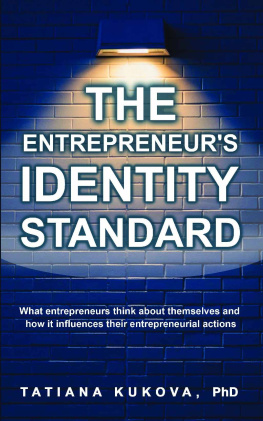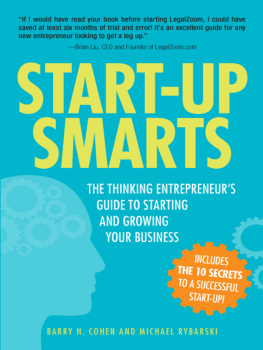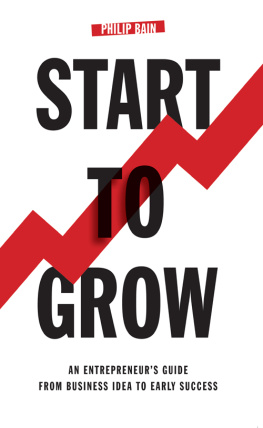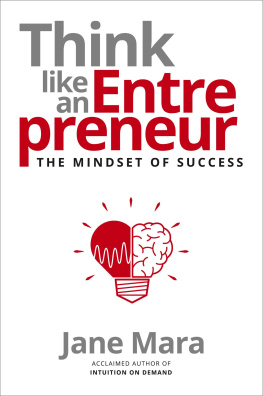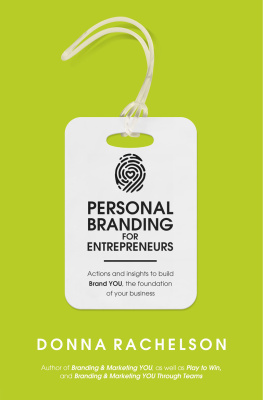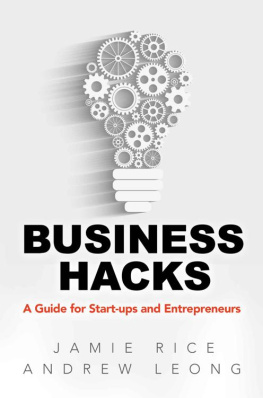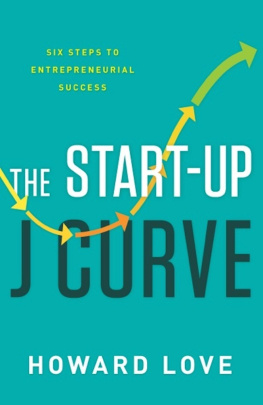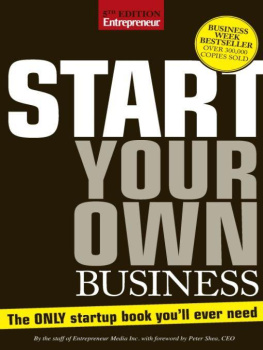The Entrepreneurs Identity Standard
What entrepreneurs think about themselves and how it influences their entrepreneurial actions
TATIANA KUKOVA, PhD

Copyright 2020, Tatiana Kukova, PhD
All rights reserved. Printed in the U.S.A.
No part of this publication may be reproduced or transmitted in any form or by any means, electronic or mechanical, including photocopy, recording or any information storage and retrieval system now known or to be invented, without permission in writing from the publisher, except by a reviewer who wishes to quote brief passages in connection with a review written for inclusion in a magazine, newspaper or broadcast.
Quantity Purchases:
Companies, professional groups, clubs, and other organizations may qualify for special terms when ordering quantities of this title.
For information, email ,
or call (847) 598-1150 ext. 4141.
www.ebooks2go.net
Published in the United States
by eBooks2go, Inc.
1827 Walden Office Square, Suite 260, Schaumburg, IL 60173
Paperback ISBN: 978-1-5457-5272-2
Hardcover ISBN: 978-1-5457-5281-4
ePUB ISBN: 978-1-5457-5273-9
Mobi ISBN: 978-1-5457-5274-6
Library of Congress Cataloging in Publication
To my Mum and Dad: I know that I am
the apple of your eye.
To all my entrepreneurs:
I wanted to give something back.

CONTENTS

Introduction
To Set the Wheels in Motion
Chapter 1
The Gist
Chapter 2
My Entrepreneurs
Chapter 3
The Entrepreneurs Identity Standard
Chapter 4
Strategic Actions inside a Start-Up
Chapter 5
Strategic Actions outside a Start-Up
Chapter 6
The Point of No Return
Introduction

TO SET THE WHEELS IN MOTION

The most important CEO skill is to be able to manage his own psychology.
BEN HOROWITZ
Dear Start-up Entrepreneur,
I cant help but start with the most recent events caused by the COVID-19 world pandemic at the beginning of 2020. Following the evidence offered by academics and professional researchers from the national Enterprise Research Centre UK, the country was already in recession by May 2020, which seemed to be a global trend.
On the one hand, small and medium-sized enterprises or companies (SMEs) attracted much attention because of how the economic shutdown had affected their trade. SMEs included bars, restaurants, cafes, day spas and wellness centres, beauty salons, small local shops, bakeries, and other establishments in the form of franchisees. Baking from home became the new normal for a markedly large population. On the other hand, high-tech start-ups were less visible to the general public. Despite that, the shutdown had profoundly changed their operations, urging founders to rethink their business models.
Following This Week in Start-Ups, a US weekly podcast hosted by Jason Calacanis, most founders had cut their salaries by 50 to 80 per cent or had decided to continue their day-to-day operations with no pay. Furthermore, many employees had lost their jobs and this is regardless of whether tech or non-tech companies employed them.
According to Wired UK, by autumn 2020, even more employees are going to lose their jobs, small start-ups will shut down, and investors will be short of capital because of their failed investments. It appears that new start-ups may require more cash in the months ahead.
In a nutshell, the picture is gloomy for many tech start-up founders and small business owners. Also reported by Wired UK, tech giants, including Uber Eats, Just Eat, and Deliveroo have already felt the full extent of the crisis on their bottom lines. This downturn also accounts for strategic partnerships these companies have with McDonalds, KFC, Subway, and Wagamama. It is also undoubtedly true regarding the health and safety of their staff and products. As you may have seen, these are not the only examples from the food delivery market.
This means that there are fewer customers than usual, which affects customer financing, often referred to as revenue or sales revenue a considerable chunk of which has already disappeared in a flash. However, this is not the only outcome. No wonder employers and employees are under a lot of stress and pressure, which might lead to anxiety and various other psychological challenges.
The book you have just opened is entitled The Entrepreneurs Identity Standard: What entrepreneurs think about themselves and how it influences their entrepreneurial actions. Ive done it for a number of reasons.
First and foremost, I believe that The Entrepreneurs Identity Standard solves the psychological problem of how you deal with strategic decision-making processes in your start-up, especially in the current climate. Consequently, it creates value by explaining what the entrepreneurs identity is and why it is of considerable significance to you to be aware of it.
Secondly, I genuinely believe that my ideas are innovative and worth spreading because I base The Entrepreneurs Identity Standard on a pioneering doctoral study which I conducted at one UK technology start-up incubator a few years ago. That opportunity allowed me to spend the most enjoyable time with tech start-up founders. My pioneering doctoral research was the foundation for the 2015-2017 United Kingdom Science and Technology Parks Survey (UKSTP Survey) conducted by academics at Aston Business School in Birmingham, UK. That is why this is a personal book where I want to engage your interest from the first few pages.
Therefore, this book is of service to you. Whether you are a student, a first-time founder, a serial entrepreneur, or an investor who works with start-ups, this will be a breakthrough book for you, as it rationalises the social psychology behind the role of the entrepreneur and their actions. I am eager to share with you what the start-up founders revealed to me about themselves to make you understand how that influenced their strategic choices inside and outside their ventures.
Furthermore, I believe that The Entrepreneurs Identity Standard will challenge you to rethink how you see others, including investors, executive team members, other start-up founders, and employees. It will help you adjust how you reach your decisions accordingly.
I also believe that The Entrepreneurs Identity Standard will advance your knowledge, improve your judgement, and perfect your character. It seems that the booming high-tech industries across the world urgently require this type of entrepreneurial talent.
Perhaps most crucially, I am fond of practical examples, so youll see them in abundance in my book. Some of them are general. Most of them, however, are grounded in my research data, which show how tech start-up founders make strategic decisions based on their identity.
I have removed academic jargon and a rather vague wording for simplicity, since I trust that different sectors can apply the ideas of
Next page
